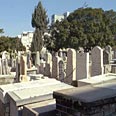
Let's not bury the facts: The shortage in burial plots in Israel is worsening, leaving some municipal cemeteries with scarce few spots available. The Yarkon Cemetery, the final resting place of most of the Dan agglomeration's deceased, announced on Thursday that it would completely run out of plots within a year's time. Many cemeteries throughout the country have already begun using saturated burial methods to compensate for the diminishing space. In Nahariya, dozens of residents organized a protest earlier this month after the city's cemetery could not longer offer plots.
Rand said that there are only 5,000 plots left at the Yarkon Cemetery, and that after these are filled "there will just be no more burial space left." The Tel Aviv Cherva kadisha buries 8,000 people a year, and was the first area to perform Sanhedrin burial - in caves and chambers.
"This allows for more graves per one Dunam. The field burial method cannot be continued. We are serving two million people and if each one requires a gravesite, it will be impossible to accommodate everyone.”
The Yarkon Cemetery is the only active cemetery in the Dan Region (that is, the only one free of charge), serving Tel Aviv, Ramat Gan, Holon, Bat Yam, Kiryat Ono and other central cities. Rand says that Chevra Kadisha needs money to purchase more burial grounds on which to build new cemeteries – but additional funds are also in shortage.
Who will pay for it?
“The dispute in the government is on who will fund the purchase. We’re talking tens of millions of shekels. We wrote letters to the prime minister more than once in request for funds but the argument has yet to be resolved. If we don’t find a solution, we will definitely be in trouble.”
The matter was addressed by the Finance Ministry’s last year, in a bill promoting the new burial methods by making additional payments to the non-profit burial societies. According to the government’s decision from April 2007, “the budget supplement will be transferred to the National Authority for Religious Services at the prime minister’s office, to be divided between the various Chevra Kadisha centers in Israel.”
The National Authority for Religious Services’ spokesperson said in response that “any matter concerning allocation of burial grounds is under the exclusive responsibility and handling of the local authorities and the Israel Land Administration. The office (for religious services) has no authority over the matter.
"The Religious Council and the National Authority for Religious Services only steps in to supervise the council’s activity after the land is approved as a cemetery site, and to operate and perform the actual burials.
“In order for Chevra Kadisha centers to begin building the structures needed for saturated burial, there needs to be a change in the burial fees. This matter has been on the Knesset's Finance Committee’s agenda for the past few months, but unfortunately, the process has yet to be completed.”
Ahiya Raved contributed to this report















